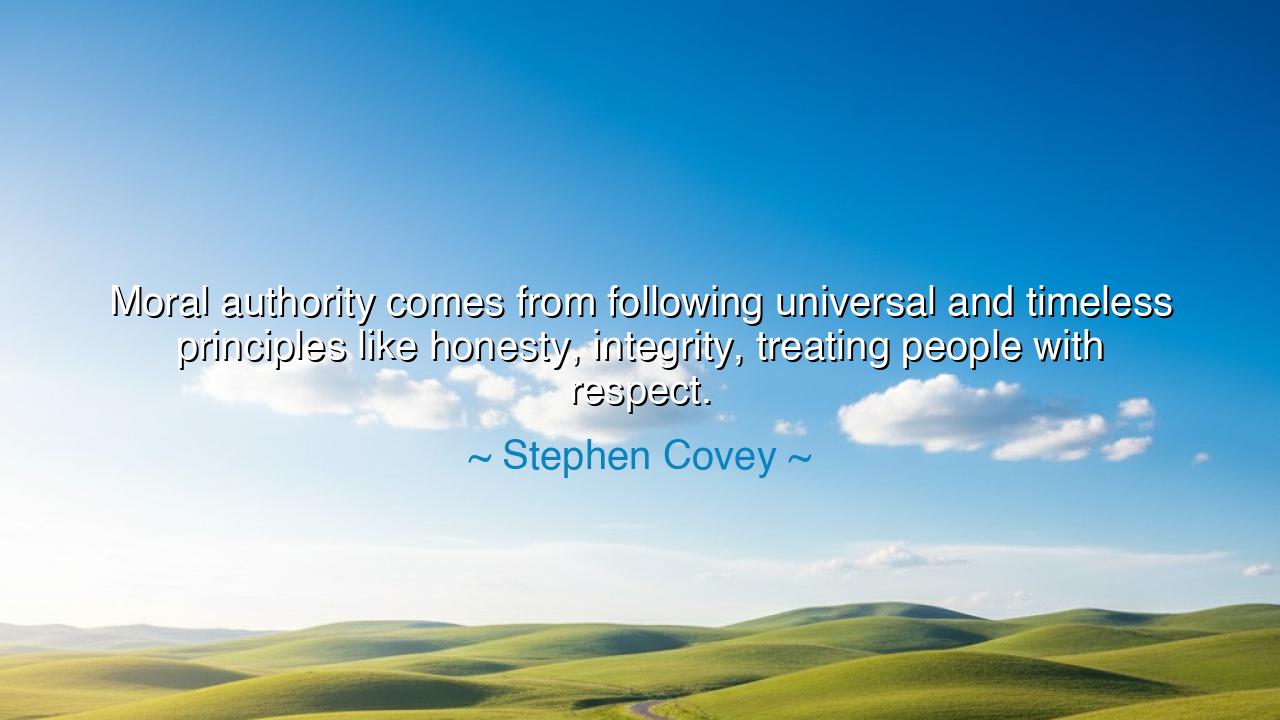
Moral authority comes from following universal and timeless
Moral authority comes from following universal and timeless principles like honesty, integrity, treating people with respect.






Stephen Covey, teacher of wisdom in our age, gave voice to a truth as old as the stars: “Moral authority comes from following universal and timeless principles like honesty, integrity, treating people with respect.” These words, though simple, hold the weight of civilizations, for they point not to fleeting customs or shifting laws, but to principles that endure beyond the rise and fall of kingdoms. Moral authority is not seized by force, nor purchased with gold; it is earned, quietly yet powerfully, through the steady practice of virtues that never decay.
What is honesty but the foundation of trust? And what is trust but the mortar that binds families, communities, and nations? Without honesty, the grandest palace collapses into dust, and the strongest army falters from within. Integrity is the twin pillar, the wholeness of a person whose word and deed are one. To treat others with respect is to acknowledge the divine spark in every soul, whether humble or mighty. These principles are not bound to time or place; they are eternal laws written not on parchment, but upon the heart of mankind.
History itself bears witness to the power of such authority. Consider the life of Abraham Lincoln, who steered his nation through the storms of civil war. He did not command respect by the sword alone, but by the moral authority of his integrity, his honesty, and his respect even for those who opposed him. When he declared, “With malice toward none, with charity for all,” he embodied the universal principles that Covey describes. Lincoln’s strength was not merely political—it was moral, and that is why his memory endures when so many other rulers are forgotten.
Contrast this with those who sought power without principle. Their reigns may have glittered for a moment, but without honesty, without respect, their legacies crumble into shame. Empires built on deceit fall swiftly; leaders who betray integrity become like shadows, remembered not with reverence but with contempt. Thus we see: true authority cannot be forced; it flows naturally from alignment with principles that stand outside of time.
O children of the future, know this: moral authority is greater than rank, title, or wealth. A parent guiding a child, a teacher shaping a mind, a worker laboring with integrity—each may wield more real authority than kings who command without respect. For people follow willingly those who embody truth, but they resist those who rule through fear. Authority rooted in principle commands the heart, not just the body.
The lesson is clear: if you would lead, first learn to follow the eternal principles. Be honest even when dishonesty seems easier. Guard your integrity even when compromise offers gain. Show respect even when others mock or despise you. In these choices lies a power that no enemy can steal, for it does not come from outside, but from within. This is the authority that lasts, the authority that inspires, the authority that heals.
In your daily life, practice small acts that strengthen this foundation. Speak truth when lies would be simpler. Honor your word even when it costs you. Look upon every soul you meet as worthy of respect. These are not grand gestures, but daily disciplines, and from them will grow a character that shines brighter than crowns and outlives monuments.
Thus, remember the teaching of Covey: moral authority comes not from the fleeting, but from the eternal. Align yourself with honesty, integrity, and respect, and your life will echo with a power that transcends time. For armies may rise and fall, thrones may be broken, but the authority of virtue endures forever, guiding humanity toward its higher self.






AAdministratorAdministrator
Welcome, honored guests. Please leave a comment, we will respond soon